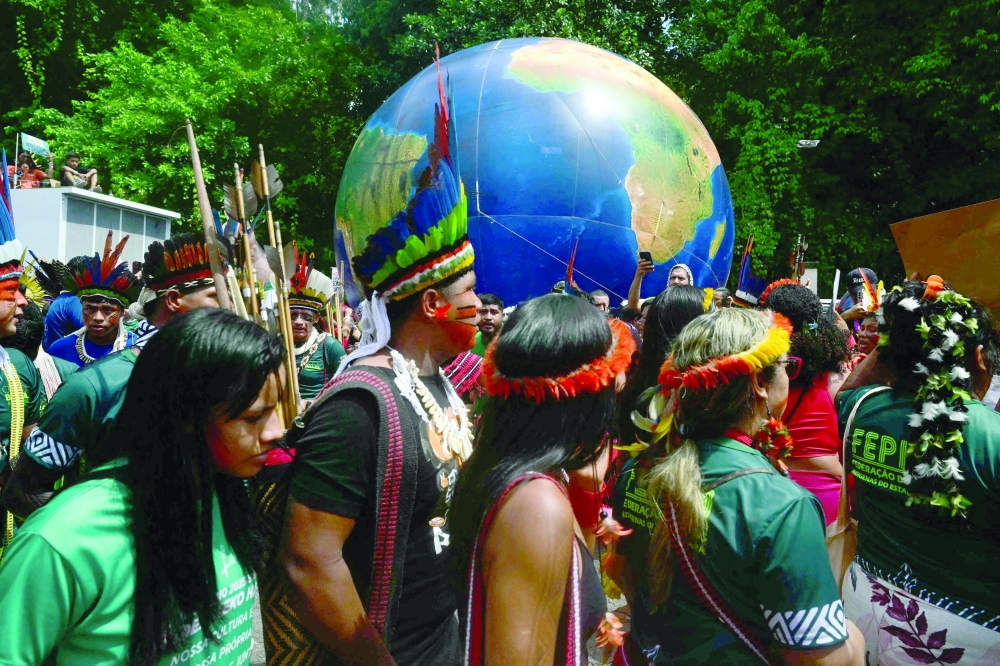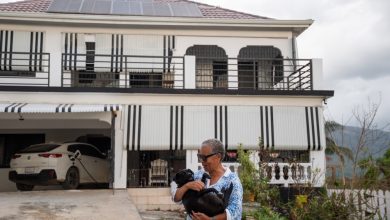First draft of climate pact lands at COP30 in Brazil

BELEM: COP30 hosts Brazil on Tuesday produced a first draft of an agreement between nations at the UN climate talks after negotiations on the sticking points stretched late into the night. The draft includes a sweep of options on the most difficult issues, reflecting the gulf between the nearly 200 nations in Belem and the work still ahead to refine a final compromise. The nine-page “Global Mutirao” document — a reference to an Indigenous concept of uniting toward a common goal — came after Brazil on Monday urged delegates to work day and night to produce an agreement by midweek.
The text leaves open a wide range of possibilities on the flashpoint issues in Belem — trade measures, finance for poorer nations, and the global inadequacy of carbon-cutting goals. But the quick turnaround of a draft on these thorny points suggested the COP30 presidency was confident it could soon have an outcome, observers said. “It represents a steady progression from the previous iteration and is likely one of the earliest releases of such a clean text in recent COP history,” said Li Shuo, a climate analyst at the Asia Society Policy Institute.
The draft reflects the stark division between a coalition wanting a “roadmap” on a fossil fuel phase-out, and a bloc led by oil-producing countries opposing any such effort. It proposes an optional “workshop” to discuss “low carbon solutions,” or a high-level ministerial roundtable on pathways to help countries “progressively overcome their dependency on fossil fuels.” A third option proposes no text at all.
The draft also raises the possibility of assessing national climate pledges annually, instead of every five years, to assess global progress in reducing greenhouse gas emissions more frequently. It also suggested financial assistance from wealthy countries to developing ones for adaptation to climate change should be tripled by 2030 or 2035 — a key demand from poorer nations.
Proposals to address concerns over trade were also included, as China leads a push in Belem against “unilateral” measures and the EU’s carbon price on imports in particular. On this sensitive issue, four proposals were outlined in the draft, including the creation of a summit under the UN Secretary-General on climate trade disputes. The marathon climate talks are supposed to end on Friday after close to two weeks of negotiation, but they frequently run into overtime.
COP30 hosts Brazil on Monday extended negotiations into the night at the UN climate talks as they pushed for a rapid compromise among countries very much at deep odds. Following a difficult first week, Brazil set a deadline for nations to finalise “a significant part” of the negotiations by Tuesday evening for approval the following day. “It’s super difficult as you know… but all involved thought that it’s worth a try” said COP30 President Andre Correa do Lago in the rainforest city of Belem where the talks are underway.
Sleepless nights are assured, with Correa do Lago extending the programme so negotiators were “able to continue working at night.” They have their work cut out.
China and India are leading a push for COP30 to adopt a decision against unilateral trade barriers, singling out the EU’s Carbon Border Adjustment Mechanism (CBAM) for attack. Tested since 2023 and set to become fully operational in 2026, CBAM targets imports of carbon-intensive goods such as steel, aluminium, cement, fertilisers, electricity and hydrogen.
The head of China’s COP30 delegation, Li Gao, said last week that nations should “avoid the negative impact of, for example, geopolitical unilateralism or protectionism.”
But the EU’s climate commissioner, Wopke Hoekstra, hit back at attacks over the bloc’s flagship policy and defended carbon pricing as “something that we need”. “We’re not going to be lured into the suggestion that actually CBAM is a unilateral trade measure. And in that realm, we’re also not going to discuss it,” Hoekstra said in a news conference.
UN climate chief Simon Stiell urged negotiators to tackle “the hardest issues fast” to avoid going into overtime at the summit’s close on Friday.
“When these issues get pushed deep into extra time, everybody loses. We absolutely cannot afford to waste time on tactical delays or stonewalling,” he said. The COP30 presidency published a memo on Sunday evening summarising the divergent viewpoints and proposing options. — AFP


